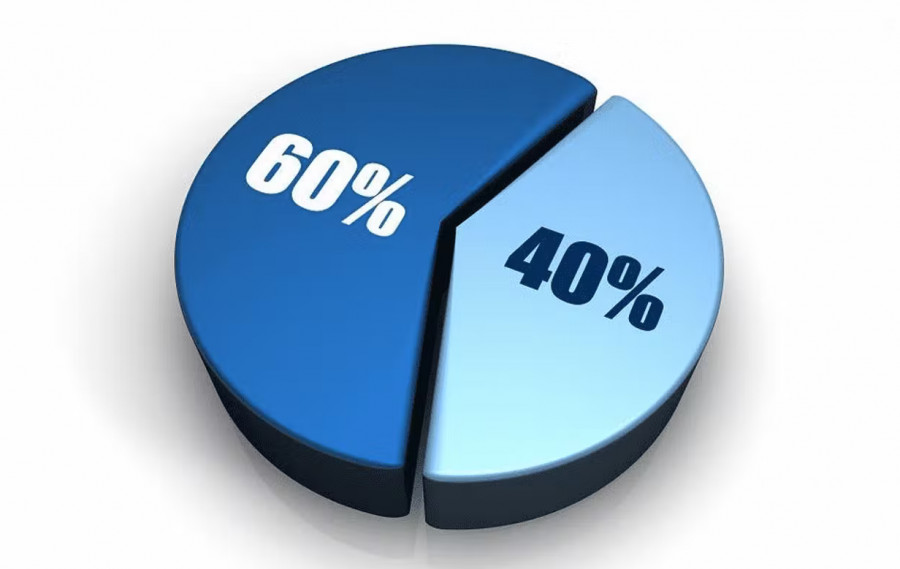One of the most popular long-term investment schemes - a portfolio split 60/40 between stocks and high-quality bonds - showed the worst performance in January 2022 since the market crash in the early days of the pandemic.
Traditional hedging schemes did not work: January brought losses to holders of standard investment portfolios
Prices of both stocks and bonds fell sharply in January thanks to the Federal Reserve's hasty hawkish policy at the end of that year. The hawkish reversal intensified after last week's policy meeting, when leading Wall Street economists pushed for a rate hike of at least 1 point this year.
The Bloomberg 60/40 composite index, which tracks the trend of such investments, lost 4.2% in January due to a wide drop in large-cap stocks by 5.6%. This is the worst indicator after a 7.7% drop in March 2020, when the economy idled due to quarantine.
Investors still believe that the market is highly dependent on the Fed's next steps and the subsequent impact on inflation, economic growth and corporate earnings during the upcoming rate hike cycle.
It has now become obvious to everyone that increased inflation can force the Fed to become more aggressive and cause higher market volatility, undermining the effectiveness of diversified portfolios over a long period.
But bonds also did not lag behind traditionally more profitable stocks.
Benchmark Treasury yields were down two basis points to 1.75% as of 6:36 a.m. in New York after surging 27 basis points in January, the biggest gain in ten months.
"We can see a stagflationary environment where stocks and bonds are falling as a result of constant inflation and low growth," says Nancy Davis, chief investment officer.
Investors who own a long-term combination of stocks and bonds as a hedge fund need only look back at 2018 to understand that the tightening of the Fed may well lead to negative yields.
The 60/40 strategy brought losses to its owners of 2.3% in 2018, which was the second largest loss since the creation of the Bloomberg index in 2007 (the primacy belongs to the crisis year 2008).
Popular model fails
The 60/40 strategy became popular back in the 1980s. Over the longer term, it consistently delivers a 10% annual return and is a popular model for most Americans' retirement plans offered by asset managers.
The attraction of a diversified investment approach is that negative fluctuations for both stocks and bonds have usually been short-lived in the past.
Quality bonds, such as Treasuries, are traditionally less volatile than stocks and tend to rise in value when risky assets fall sharply. In turn, stocks make the most of their earnings over time as companies have steadily increased their earnings outside of a recession.
Alas, with the introduction of the low interest rate regime, the portfolio seems to have ceased to be a reliable investment vehicle.
For most of the last decade, the strong performance of 60/40 portfolio holdings reflected a climate of very low inflation, limited growth in bond yields, and a booming stock market. This has resulted in a challenging environment for generating future earnings as both stock and bond valuations ended at a high level in 2021.
Investors are looking for new opportunities
Before the notable decline in the 60/40 this month, investors have repeatedly looked for ways to abandon this approach.
For example, some argue for a downgrade of the bond component because the high-quality fixed-rate yield is below the current rate of inflation, which reduces the yield's purchasing power.
Others believe a move away from high-priced big US stocks to lower value smaller stocks in global markets such as the UK, Europe and emerging markets could help.
Another option was to actively invest in the private debt market for a long time in an attempt to find assets that are less correlated with those of publicly traded stocks and bonds.
"Our approach to 60/40 strategies is to own more dividend-paying stocks and allocate more to alternatives while undervaluing bonds," said investment strategist Anthony Saglimbene.
Employee at Citigroup Inc. Alex Saunders also noted last week that adjusting portfolios when growth slows and inflation remains high by "re-allocating a 60/40 portfolio to real estate, CTAs, quality capital...provide similar returns with less volatility and more stable performance across modes."
Ultimately, the lack of prospects for one of the most stable investment schemes tells us that the economy is inexorably changing. Low interest rates force investors to redraw traditional schemes in search of the most optimal instruments. On the other hand, it also serves as a reminder to us that delegating the management of your money can have consequences if your fund remains committed to conservative views. Personal investing (trading) with a deep study of market laws is likely to become the leading model for the future organization of stock and other financial markets.
A classic confirmation of this is Warren Buffett, who is the only one from the top of Forbes, did not lose, but earned on the fall in January, promptly redistributing his investments.
In addition, the failure of traditional investment schemes will necessarily cause a certain number of bankruptcies among hedge funds, and after them, boomer Americans who have just retired. Americans' well-being may falter in the long run.
























